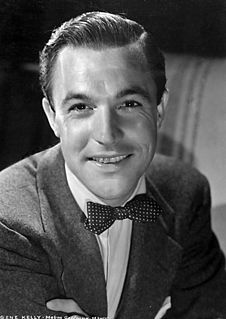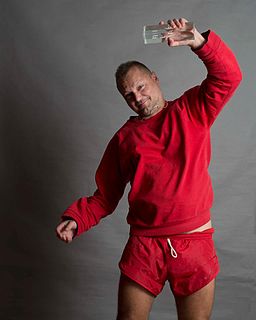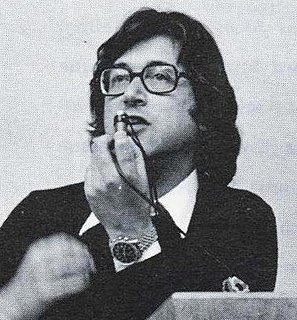A Quote by Gene Kelly
The only thing is that ordinarily when I do dance with [women] they think I am suddenly going to throw them over a table or twist them all around. All I want to do is one-two, one-two-three - a simple fox trot. But they're shaking with anticipation at the thought that I'm about to whip them around and then toss them on the roof.
Related Quotes
I turn sentences around. That's my life. I write a sentence and then I turn it around. Then I look at it and I turn it around again. Then I have lunch. Then I come back in and write another sentence. Then I have tea and turn the new sentence around. Then I read the two sentences over and turn them both around. Then I lie down on my sofa and think. Then I get up and throw them out and start from the beginning.
Great stories happen all around you every day. At the time they’re happening, you don’t think of them as stories. You probably don’t think about them at all. You experience them. You enjoy them. You learn from them. You’re inspired by them. They only become stories if someone is wise enough to share them. That’s when a story is born.
The acts of the mind, wherein it exerts its power over simple ideas, are chiefly these three: 1. Combining several simple ideas into one compound one, and thus all complex ideas are made. 2. The second is bringing two ideas, whether simple or complex, together, and setting them by one another so as to take a view of them at once, without uniting them into one, by which it gets all its ideas of relations. 3. The third is separating them from all other ideas that accompany them in their real existence: this is called abstraction, and thus all its general ideas are made.
"There are one or two elementary rules to be observed in the way of handling patients," he remarked, seating himself on the table and swinging his legs. "The most obvious is that you must never let them see that you want them. It should be pure condescension on your part seeing them at all; and the more difficulties you throw in the way of it, the more they think of it. Break your patients in early, and keep them well to heel."
Everybody knows that if they're happy then usually the people around them are happy, or that people around them happy make them a little happier; that's a proved thing, like "I give to you and you give to me"; they all know that but they haven't thought about it to the point of every action that they do. That's what it is with every action that you do, there's a reaction to it, and if you want a good reaction then you do a good action, and if you want a bad one, then you punch somebody.
Last night I thought about all the kerosene I've used in the past ten years. And I thought about books. And for the first time I realized that a man was behind each one of the books. A man had to think them up. A man had to take a long time to put them down on paper. And I'd never even thought that thought before...It took some man a lifetime maybe to put some of his thoughts down, looking around at the world and life, and then I come along in two minutes and boom! it's all over.
I say with pride that I've done over a hundred voices or something, and some of them may have only had two or three lines, but I literally never ran out. I think I'm a bit of a savant that way. I kind of remember every voice I hear, famous or otherwise, and can imitate it pretty fast. I've enjoyed mimicking people famous and not famous all through my life, and they kind of remain in the memory banks, so I'm ready to trot them out.
Even when I'm writing animation, I think of them as real people. I think of them as completely three-dimensional beings, even if it's a talking teapot. I don't think of them as one-dimensional drawn characters running around. Maybe that's why, to me, there's really no difference in writing the two - animation versus live action.
I want women to see, especially us big women, that you don't have to let them cut you and suck it out. You don't have to let them staple you up. You don't have to let them give you a pill. You don't have to let them put a band around your organs. If you just put the work in, baby, I promise you, it comes off.
You start to stress yourself out about the people around you. You start to think, like, "What do you really want from me?" And then you forget that you, at some point, asked them for something. At some point you needed them to take you in because you ain't had nowhere to go. And now you turn around and question their loyalty to you, and those were the only people loyal to you. The only people that really loved you are still there, and you tanked on them. I'll never let that happen.




































